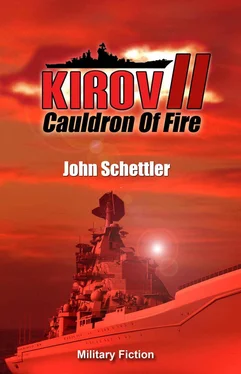Then he fired, and the powerful 20mm cannons snarled in anger, joined by the fitful chatter of his Browning .303s. The guns sent a hail of iron at the center of the ship, raking the sea in a wild rain of fire and water and smashing into the superstructure in a storm of fire and smoke.
~ ~ ~
Volskyheard the guns firing, then the terrible howl of the plane’s engines as it flashed by overhead. The sea was awash with spray where the leading rounds fell short, but they raked across the center of the ship, shuddering into her superstructure and sending a scatter of flayed aluminum shrapnel and hot white sparks flying in all directions as the heavy rounds slammed into Kirov with deadly effect. Admiral Volsky felt a searing hot pain as something struck his side and leg, and he was flung from his perch on the ladder, falling all of eight feet with a hard thud as his head struck a hand rail below. He was lucky he had not climbed higher, as the fall itself could have killed him. As it was, he lay unconscious and bleeding from shrapnel wounds on the deck below, and did not hear the shrill panic that wailed through the ship as heavy booted men were running in all directions, shouting and donning life preservers and helmets as they manned their battle stations.
On the bridge, acting Starpom , Anton Fedorov heard the awful drone of the plane as it dove to attack, hastening to the port viewport in a state of surprise and shock. Rodenko had been complaining of a strange interference on his sensor screens—Tasarov as well, but they had seen and heard nothing until the distant sound of an aircraft emerged from the thick cottony silence of the night, strangely attenuated, now loud and threatening, and then hollow and forlorn. The air seemed suddenly charged with heavy static, and a throbbing pulsation seemed to quaver all around them. Fedorov took in the scene outside the ship with wild surmise. The sea was aglow with undulating light, and the skies were brightening with an impossible luminescence. He glanced quickly at his chronometer and read the time. It was 1:37 in the morning, and the night had been clear and dark just a few moments ago, the new moon not yet risen. What was happening?
Then the sound of the aircraft seemed an angry roar, and Fedorov’s better instincts for survival prompted him to wheel about. “Sound alarm,” he shouted. “Battle Stations!”
A split second later the night sky seemed to erupt with light and fire, something came flashing down from above in terrible rage, and white hot shafts of light seemed to pass in through the view panes and bulkheads, like lasers, vanishing into the guts of the ship. The sound that followed was clear and unmistakable, a rattling grind of metal on metal. It was as if the light had suddenly found shape and form, and become a liquid fire, then hard iron as it finally bit into the ship.
They felt heavy rounds shudder against the armored citadel and sheer through the lattice of more delicate antenna domes above them. Then the deep growl of the plane’s engines diminished, fading off the starboard side of the ship. Fedorov turned and saw everyone on the bridge staring at him, some with expressions of shock and others with fear and amazement. His mind was racing as he struggled to make sense of what he had just experienced.
“Did you see that?” Tasarov was pointing to the spot where the searing light had lanced through the bridge and vanished into the deck plates, but there was no sign of damage there at all.
Fedorov could not answer him. He knew he had to do something, take military action to secure the safety of the ship, but what should he do? He was trained as a navigator. He had never gone to combat schools, though his instincts were good and his judgment usually sound, he had no real reflex for battle at sea. He removed his cap for a moment, running the sleeve of his jacket over his brow where a cold sweat had settled. They were all waiting, watching him now, and he struggled to remember how Admiral Volsky would act in a similar situation, and how Karpov would maneuver the ship in the heat of an engagement.
“Rodenko,” he said haltingly. “Look to your screen. Are we tracking that aircraft?”
“There was nothing on my readout earlier, sir, but yes, I can see him now, just barely. The signal is very weak and I still have a lot of clutter, but he’s moving off to the south—fading in and out. I don’t think he’s coming around again.”
“Tasarov—anything?” Fedorov wanted to know what was happening beneath them as well. The first rule, he remembered, was to assess their immediate situation and get as clear a picture as possible of the battle space around them. He had seen Karpov do this on exercise many times, and so he did the same, checking the ship’s eyes and ears, and letting the unanswerable questions go for the moment.
Tasarov fitted his headset more snuggly, closing his eyes. Then he blinked and checked his sensor screens as well. “Nothing sir,” he said. “The sea is calm. I have no transients—but I have no range either. Something is wrong, sir.”
“Helm, come around. Fifteen degrees to port.”
“Port fifteen, sir and coming about on a heading of 210.”
Change your heading, he thought. Good. He had seen Karpov do this as well to throw any stalking enemy off the scent, the most rudimentary of evasive maneuvers. As the ship came around on the new heading the tension subsided somewhat, and then Fedorov looked to his radio man. “Mr. Nikolin,” he said calmly. “Please activate the Tin Man display and do a full pan of our forward and rear arcs.” If the sensors had not seen the plane, he thought, what else might they have missed?
“Aye, sir.” Nikolin toggled his display to activate HD video camera systems for optical data feed to a hi-res flat panel monitor on the bridge. These systems stood on the forward and aft towers to give the bridge a real time 360 degree video view of the surrounding area. The feed came in, with mild breakup due to the residual static that still seemed to be affecting all the equipment on the bridge, but Fedorov could see that the image showed a clear, calm sea, with no sign of any visual contact on any heading. Yet it was broad daylight now! The scene seemed to astound the junior bridge crew members, who watched the screen with large round eyes, looking at the images and then at Fedorov to note his reaction. Light streamed in through their forward view panes, chasing the soft glow of their night lighting away. Fedorov blinked, amazed, but composed himself to try and set an example for the men.
“You’ve had an easy life these last ten days or so, Mr. Nikolin,” said Fedorov. “Now would you kindly do a full search of the entire radio band. Scan everything, AM, FM, wireless and short wave bands as well, and please notify me of anything you receive.”
“Aye, sir.” The young mishman was soon busy at his radio set, and then Fedorov turned to his last senior midshipman on the watch, Victor Samsonov, his strong right arm at the Combat Information Center.
“Mr. Samsonov,” he said coolly. “Your report, please.”
Samsonov swallowed hard, his thick features uncertain for a moment, then launched himself into a standard status check report, his voice deep and clear. “Sir,” he began, “I have nothing on my board by way of an active contact, and no systems are engaged at this time. The aircraft which made that strafing run has vanished, as least that is what my systems indicate. My board notes two fire control radar systems reporting red with full malfunction—both on the forward MR-90 systems, and I have one yellow light on the S-300 system as well.”
There was apparently damage to the ship’s medium range air defense guidance radar sets for the “Klinok” (Blade) surface to air missile package, the ship’s primary AA defense for threats at medium ranges between thirty and 90 kilometers. NATO planners once referred to it as the “Gauntlet” system due to its lethal efficiency, and the system aboard Kirov had seen many improvements since that time. The yellow light on the S-300s referred to the longer range vertically mounted SAMs on the far forward deck, a separate system, but equally lethal. They had used it weeks ago to devastate the carrier air flights off Victorious and Furious , and the thought that it might be compromised in any way filled Fedorov with misgivings.
Читать дальше












